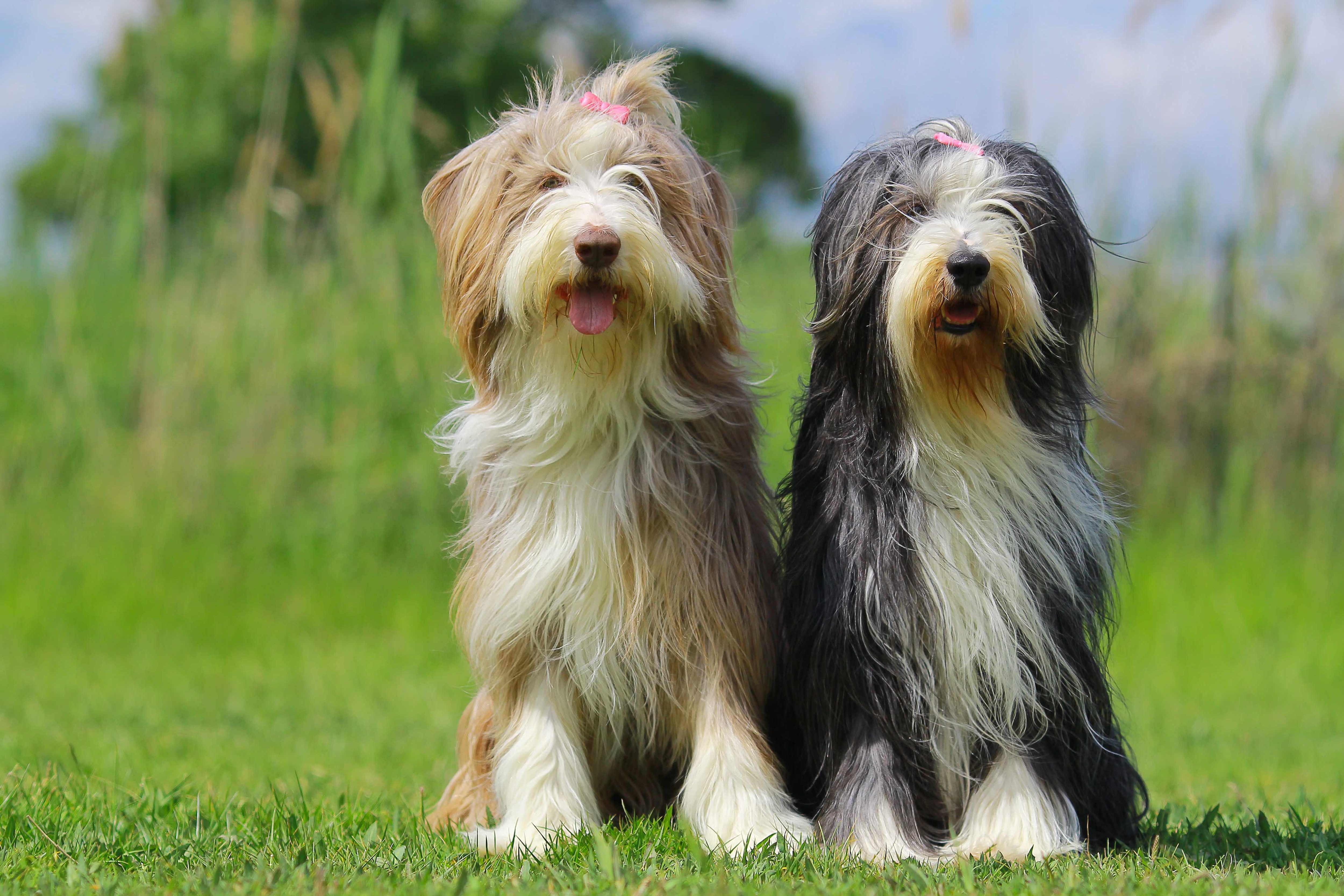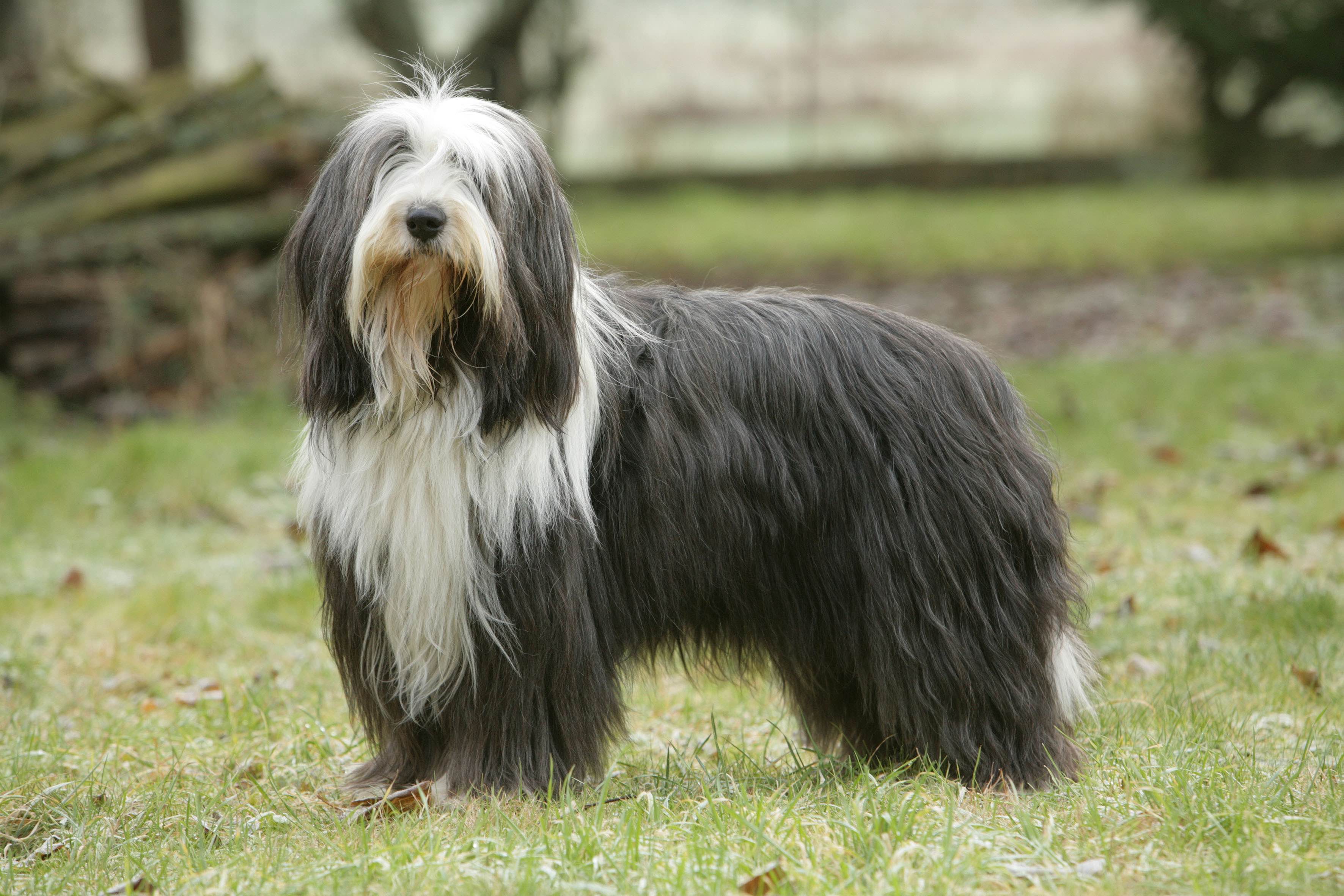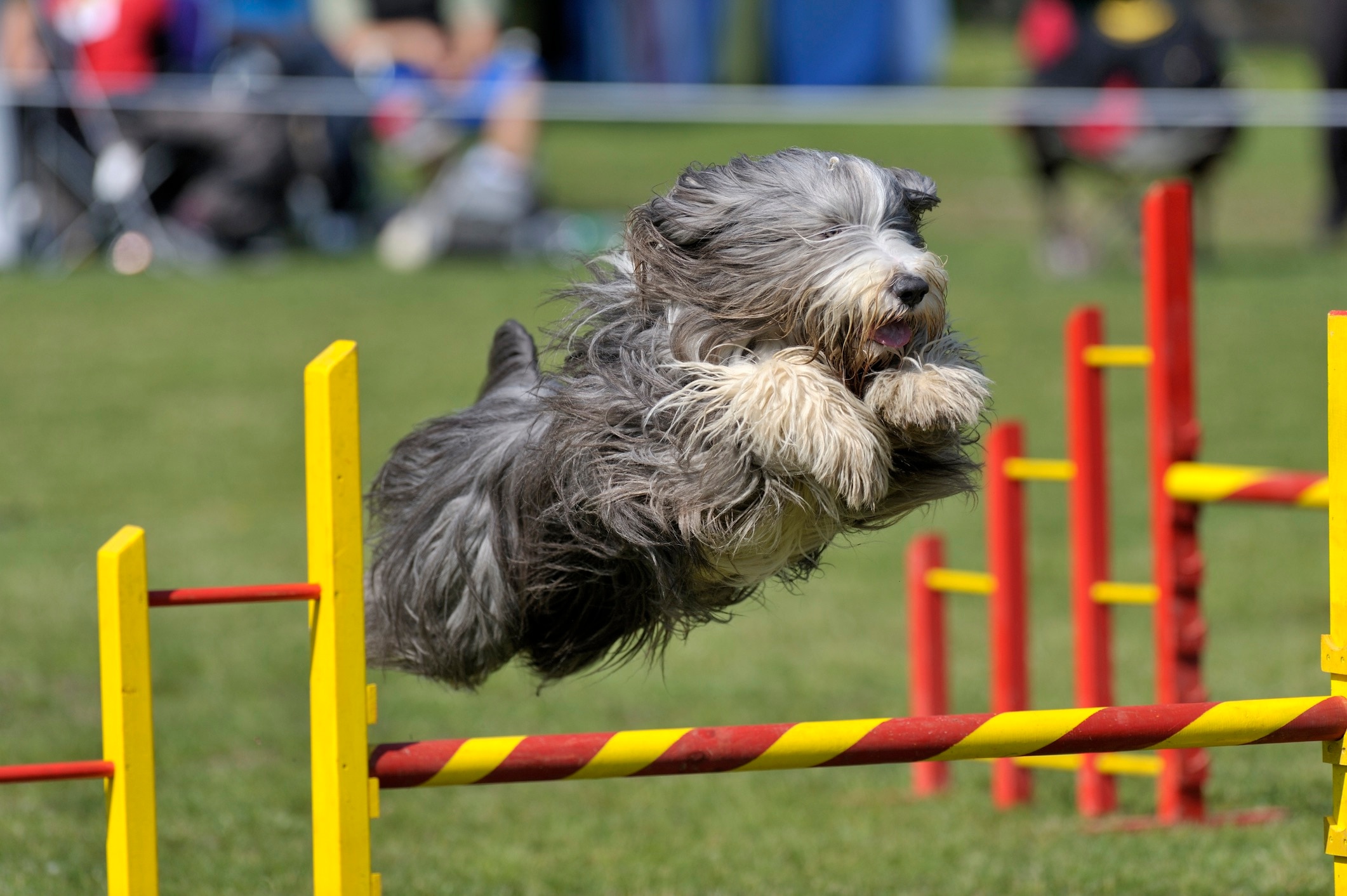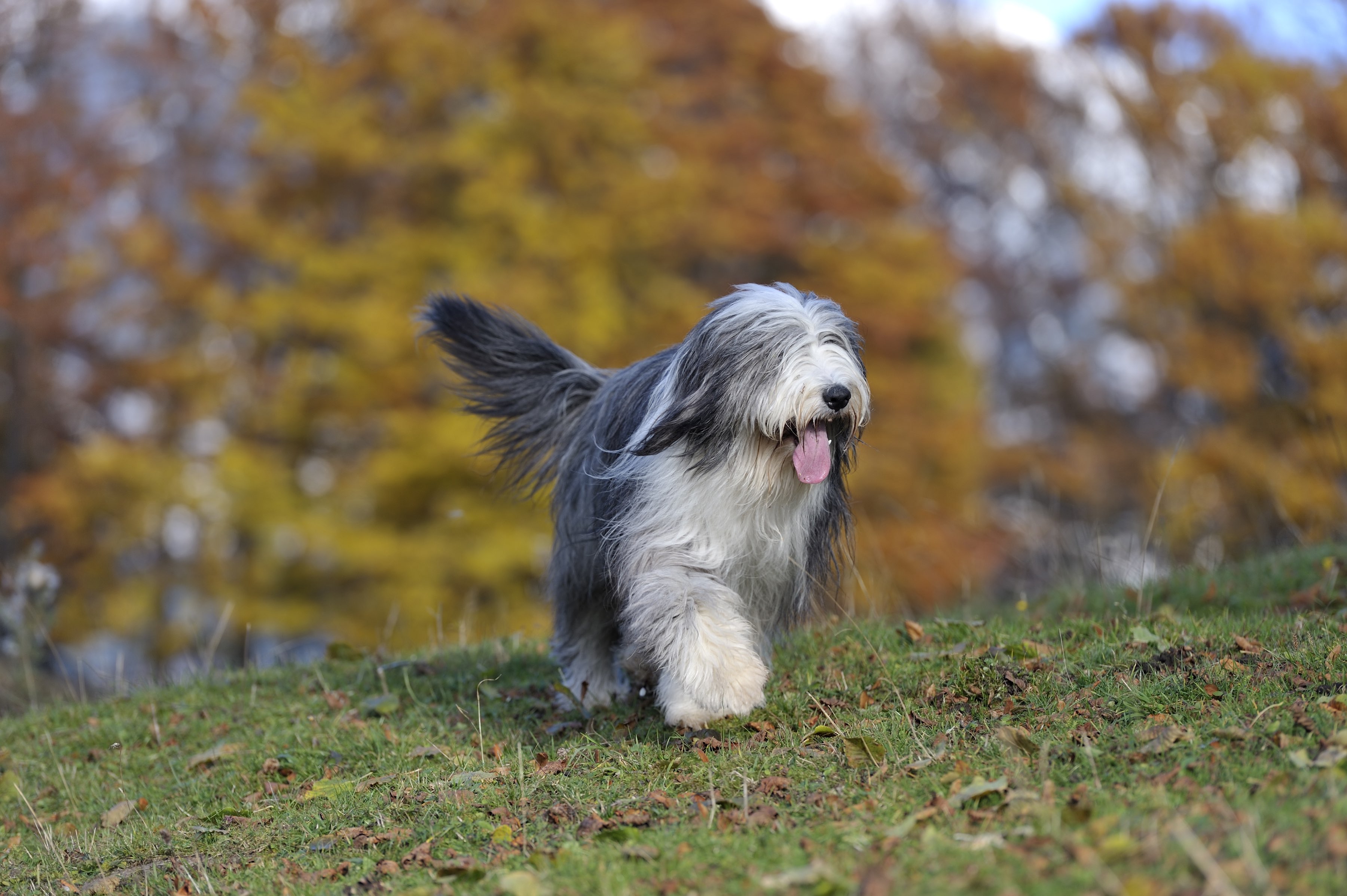Bearded Collie
Adobe Stock/Dogs
The Bearded Collie, known affectionately as a Beardie, historically flourished as a herding dog in Scotland, according to the Bearded Collie Club of America (BCCA). Renowned for their boundless energy and independent thinking skills, they are still minding herds today.
Bearded Collies are medium-sized dogs that stand 20–22 inches tall and weigh between 45 and 55 pounds.
Caring for a Bearded Collie
According to the BCCA, the Bearded Collie temperament is “active, outgoing, bouncy, [and] affectionate.” Pet parents should be prepared to meet the needs of this herding breed, which include daily exercise and ample mental stimulation. The Beardie’s long coat needs a dedicated grooming routine as well.
For those prepared to meet these needs, a Bearded Collie dog can make a great addition to the family.
Bearded Collie Health Issues

Bearded Collies are a relatively healthy breed with an average lifespan of 12–14 years. But no dog is completely in the clear when it comes to health issues, and there are a few conditions Beardies can develop. Pet insurance may be a good investment for families interested in a Bearded Collie puppy.
Hip Dysplasia
Hip dysplasia is a genetic condition that commonly affects medium and large dogs. It’s characterized by a loose hip joint caused by improper development. Hip dysplasia can cause pain, inflammation, and eventually arthritis.
Proper nutrition, exercise, and keeping your dog at a healthy weight can help lessen the symptoms of hip dysplasia. The condition can be managed with joint supplements and pain medication under a veterinarian’s guidance, but severe cases may need surgical correction.
Addison’s Disease
Addison’s disease is when a dog’s body doesn’t produce enough corticosteroid levels. This can make dogs more susceptible to stress, and warning signs include diarrhea, vomiting, and sudden lethargy.
Progressive Retinal Atrophy (PRA)
Progressive retinal atrophy is when the rods and cones in a dog’s eyes break down, resulting in blindness. There is no cure for PRA, but most blind dogs can live happily with the help of their pet parents. Reputable Bearded Collie breeders will test their pups for this genetic problem and won’t breed affected dogs.
What To Feed a Bearded Collie

To choose the best dog food for your Bearded Collie, work with your veterinarian. They can help you find a food that meets the nutritional standards set by the Association of American Feed Control Officials (AAFCO).
You should always feed your dog a food that’s formulated for their current life stage (puppy, adult, or senior).
How To Feed a Bearded Collie
Feed your Bearded Collie at least twice a day. Bearded Collie puppies will need more frequent meals—about three or four throughout the day.
If your Beardie eats too quickly, try offering their food in a slow feeder bowl. This is also a good way for your dog to get mental stimulation during mealtimes.
How Much Should You Feed a Bearded Collie?
The amount of food you give your dog depends on your individual Beardie’s lifestyle, weight, age, and health. Your AAFCO-approved dog food packaging will provide guidance on portions based on your dog’s weight, but talking to your veterinarian will give you the best information.
Nutritional Tips for Bearded Collies
Dogs eating an AAFCO-compliant formula should receive all the nutrients they require. However, veterinarians may sometimes recommend supplements for your Bearded Collie to address any health considerations. Never give your dog a supplement without your veterinarian’s guidance.
Behavior and Training Tips for Bearded Collies
Bearded Collie Personality and Temperament

Bearded Collies are friendly dogs that can get along well with other pets at home, from cats and tiny Chihuahuas to giant Irish Wolfhounds, according to the BCCA. Beardies are also gentle around children, though all interactions between kids and dogs—no matter the breed—must be supervised.
It’s important to remember that every dog is an individual, and breed only makes up about 9% of a particular dog’s temperament. The BCCA says the Bearded Collie temperament can range from laid-back and sweet to rowdy and rambunctious.
Bearded Collie Behavior
As an intelligent working dog, a Bearded Collie needs to keep both mind and body active. They are naturally curious pups and can thrive as herders, but they don’t need to be on a farm to be happy as long as their needs are met.
Be aware that, as a herding breed, Beardies may be tempted to chase and herd other animals, children, and even cars. Consistent training is a must, and keeping your dog on a leash or inside a fenced space when they’re outside is important for their safety.
Bearded Collie Training
A Bearded Collie’s brain is the most important thing to keep in mind during training sessions. They are easily distracted and need to be properly motivated to be effectively taught, according to the BCCA. But they’re also smart dogs and can pick up on cues quickly with the proper positive reinforcement methods. A variety of treats combined with effusive praise often works best, but pet parents can experiment with what gets their Beardie’s attention.
Begin socializing your Bearded Collie puppy as soon as you bring them home, and ask your breeder how they’ve approached socialization so far. Exposure to new situations, animals, and people in their first weeks of life is critical for your Beardie to grow into a confident dog.
Fun Activities for Bearded Collies
Bearded Collie Grooming Guide
The iconic Bearded Collie fluff requires some high-maintenance care. Most of a Beardie’s care is focused on untangling their luscious locks.
Skin Care
A Bearded Collie does not have specialized skincare needs outside of routine bathing. Talk to your vet about how often you should bathe your dog. You should also talk to your veterinarian if you notice changes in your dog’s skin.
Coat Care
As the pet parent of a Bearded Collie, most of your grooming routine will focus on their long fur. Beardies have a double layer of hair designed to insulate and protect them from the elements in the herding field: a soft downy undercoat and “stiffer and longer guard hairs that form a protective layer to protect undercoat and skin from harsh weather and cold water,” according to the BCCA.
This dual coat is prone to matting, and the breed club recommends a 10- to 15-minute brushing session every day, along with a more thorough brushing weekly to prevent tangles and remove any debris your dog has picked up.
Begin grooming your Bearded Collie puppy early to get them used to the process.
Eye Care
Be alert for changes in your dog’s eyes or vision. If you notice discharge, redness, or cloudiness, or if your dog is suddenly reluctant to go outside at night or begins bumping into things, contact your vet.
Ear Care
Clean your dog’s ears regularly with a veterinarian-approved cleaner. Contact your vet if you see signs of an ear infection.
Considerations for Pet Parents

Before bringing home a Bearded Collie puppy, make sure you have the time to dedicate to this dog’s need for exercise, stimulation, and grooming. Early and consistent training and socialization are also important for a Beardie to grow into a well-adjusted, people-orientated dog. Know that training this independently minded dog can be a practice in patience.
Beardies would love a large yard to run in, and that yard needs to be fenced to keep them from running after neighborhood wildlife.
Bearded Collie FAQs
Are Bearded Collies good pets?
Yes, Bearded Collie dogs can make good pets for a family that prioritizes exercising, training, and grooming them.
Are Bearded Collies rare?
Bearded Collies aren’t the rarest dog breed, but they are also not common. In 2023, the American Kennel Club (AKC) ranked Bearded Collies 154th out of 200 on their list of most popular dog breeds.
Do Bearded Collies bark a lot?
All dogs bark from time to time, but Bearded Collies aren’t known to be especially talkative. Expect them to bark for the same reasons other dogs vocalize, such as for attention or to alert their family.
Do Bearded Collies shed a lot?
Bearded Collies shed an average amount, and frequent brushing can keep loose hair to a minimum.
